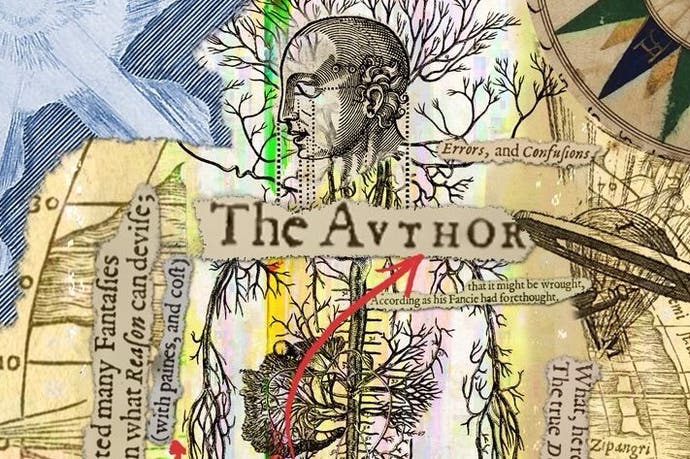Reading and writing in Ice-Bound, an unmissable narrative game
(And a bit about Jack Reacher, of all people.)
Something strange happens when I search for this poem. Something that feels funny and subversive and maybe a little bleak. I type: "There lies a den," and then Google drops in to help me. So eager to get involved. "Dental hygienist?" it prompts.
You know, as in, "There lies a dental hygienist/Beyond the seeming confines of the space/Made for the soul to wander in and trace/Its own existence, of remotest glooms." That's it. That's it. Great poetry, eh? A great poem changes every time you return to it. Because you have changed. A bit of that, certainly. A bit...
Let's step back a little. At the beginning, after the splash screen, after the parody of an EULA and the warnings regarding interactions with AI simulacrum, Ice-Bound starts to tell you a story. Text appears, one paragraph after the other. A rhythm is almost established, and then it falters. Sentences begin to glow and shudder. Interjections appear: A more organic metaphor? A more poetic word? Less pretentious. The words start to shift, new options flickering in and flickering out. On my side of the screen I try to keep up with the changes. On the other side of the screen, someone is clearly unsatisfied.
This is brilliant, I thought. The whole game in a single moment. And then I thought: but this is not quite right. Or rather: this is not quite writing. Surely writing is a bit more wordless than this? The process, strange as that sounds. Surely you lunge and then step back. Wordlessly, you know something is wrong. Wordlessly, you try to fix it. (Wordlessly, you have made it even worse.)
On the first evening of Ice-Bound I muddled around for a little and then I went home. I went home and started in on Reacher Said Nothing, a mixture of biography, documentary and literary criticism by Andy Martin. And Reacher Said Nothing is weird. If you haven't heard of Jack Reacher, he's the hard-boiled creation of Lee Child, in turn the hard-boiled creation of Jim Grant, a very tall man who used to work in telly and then got made redundant and became a best-selling novelist instead. Reacher is wonderfully tall and powerful and has opted out of the usual life since retiring from the military police. He is like The Littlest Hobo rebooted and with John Cena cast in the main role. He has a folding toothbrush and his passport and a bank card and his wits, and he wanders around the dull middle states of the US stumbling into desperate situations and getting involved in lovingly described punch-ups. The punch-ups! You never saw such punch-ups. The heart flutters. Jack Reacher books are enormously successful - each one just long enough to read on a transatlantic flight and then leave in a bedside drawer in the hotel for someone else to discover. An anti-Gideon (although I suppose Reacher has nailed certain aspects of the messiah). A kind of punch-up chain letter.
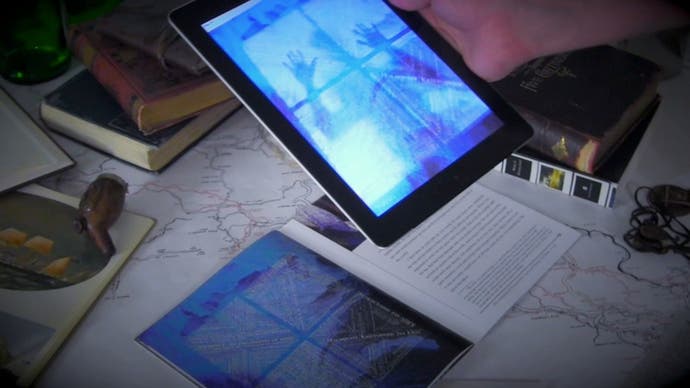
You might suspect that formulaic potboilers like this are just thrown together, and Andy Martin's book would argue that you are both very wrong and a little bit right. Martin spent a year or so watching Lee Child as he wrote the next Reacher. It's completely fascinating. Child works with no idea of the plot. He just has an idea of a place to start, and then he moves forward from there, 1000 words a day, sometimes laying track for himself, sometimes getting himself into trouble. He has a lot of things to work in that his fans demand - they all want a fight in the first ten pages, apparently! - and he has a lot of hard-boiled rules that he tries to abide by. He always starts each book on the same day of the year. Once he's off and running, he never goes back. (There is even, as Martin notes, a Reacher book called Never Go Back.)
But on the other side of things, the care is astonishing. Child frets over every word, every comma. Because there is no plan, each book unfolds moment-to-moment, the author's nose pushed up close, right against the text. And he is so analytical. No wordlessness for this guy. He is entirely self-aware regarding the business of writing a book filled with punch-ups. He would opt for a more poetic word here, a more organic metaphor there. And he would definitely cut anything pretentious. Replace it with another nod to that folding toothbrush.
Maybe this is why, when I returned to it the next day, I discovered that I love Ice-Bound: it is a game about communing with a long-dead writer, as you both try to finish his greatest work together. And the writer is so distinct, so clearly a person. I have heard people argue that Ice-Bound is a choose-your-own-adventure with clever finials clapped on, but that doesn't really get at the liveliness of it, at the sense of a dialogue that emerges across the writing of the book and actually even through the writing of the book. As Child might tell you, the finials count, even when they are the first thing to be cut.
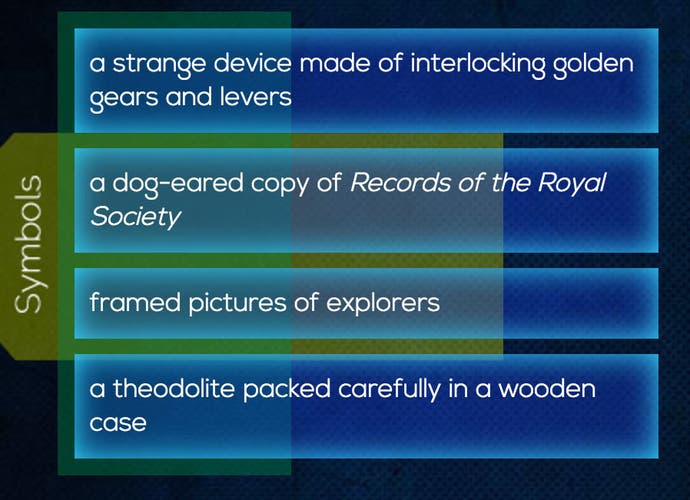
Choose Your Own Adventure books are about the adventure, anyway. They aren't about the process. They don't make the process the adventure. From the off, Ice-Bound is clever like that. That EULA, that warning about simulacrums. And when you meet your simulacrum, as you start to work with them, you realise how complex this relationship is going to be. KRIS, the simulacrum of world famous writer Kristopher Holmquist, does not know that he is not Holmquist at first. Does not know that Holmquist is dead. Does not know that Holmquist went on to become famous after he died. He has dreams though: dreams of glory, of crowds. Dreams of the fame to come.
He is a quick study - and so is the player. Holmquist's unfinished work, Ice-Bound, focuses on the exploration of an arctic station that is sinking into the permafrost. As you work through the text, you descend, each fragment of story you resolve taking you deeper.
The work is fascinating. After a discussion with Holmquist laying out the themes of the next section of text, you work with an overhead map of the station level you have reached. Each room has little sockets, and you have a number of pieces of light you can spend in these sockets, bringing their specific symbols into the book. Symbols put together create events and, eventually, potential endings. You get to choose between potential endings by moving light around and selecting different combinations of symbols, and you can also shift between this basic view of the text and a more complete view which allows you to see the paragraphs conjured by your potential symbols, events and endings.
Actually, there's one layer more, as you can choose between different wording choices in certain moments. You're not a writer, then. Not quite. You're almost an editor.
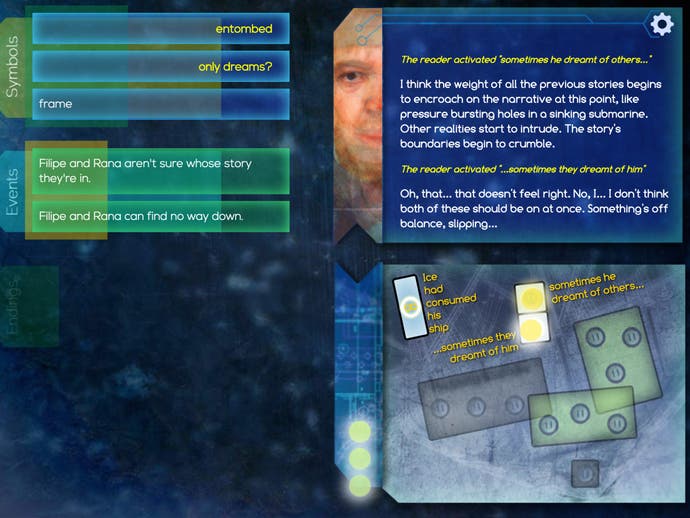
You'll maybe think of Melville, Bierce, Pynchon, and, yes, Lee Child, who does not often appear with such company. And at times, it truly feels like writing. Removed as it is, abstracted and streamlined and simplified, you glimpse the intoxicating, terrifying possibility space of writing as you shift symbols around and watch events and endings warp in and out of existence. Writing is choosing, isn't it? Choosing the words is hard enough, as Child would tell you. Choosing the punctuation is hard. But beyond that it gets really terrifying. Choosing is killing. Each option you select deselects a load of other options further down the branch. A pruning of the tree. It's like Chess. It's like Go.
I wonder if this is why writers like Child don't plan ahead. Like Reacher, who gets into a situation and has to accept its limitations, and has to brute-force his way through it, Child, despite his attention to each word, each comma, has opted out of the wider conscious possibility space of writing. He just wants a situation that he is stuck with. As Martin suggests, he proves books don't have to be about creativity. Creativity doesn't have to be creative. Creativity can be about destruction. It can be about Jack Reacher, killing the plot until there is no plot left.
In Ice-Bound, the story you're working on is only one part of the overall narrative, of course. KRIS has questions. He has a life - Holmquist's life - that starts to push through the cracks in his fiction. He has suspicions about how he is being used, or abused. He has bugs - are they bugs? - that seem to be making him say and do strange things.
After the delirious conceit of working on a book with a neural copy of the author, this secondary narrative felt like a bit of an intrusion on my first playthrough. For one thing, the breaking of the fourth wall felt curiously safe and almost predictable compared to the heady process of selecting symbols, events, and endings. Maybe the great postmodern works that Ice-Bound draws on have their own well-worn pitfalls, their own safe turns towards home? Maybe the descent into entropy is a way of easing into a rut? It might just be that now my own mind is coming apart I have impossible standards when it comes to seeing similar things represented in fiction. Regardless, even here there is real craft, and plenty of dazzling moments that would easily be the best elements of other, lesser games.
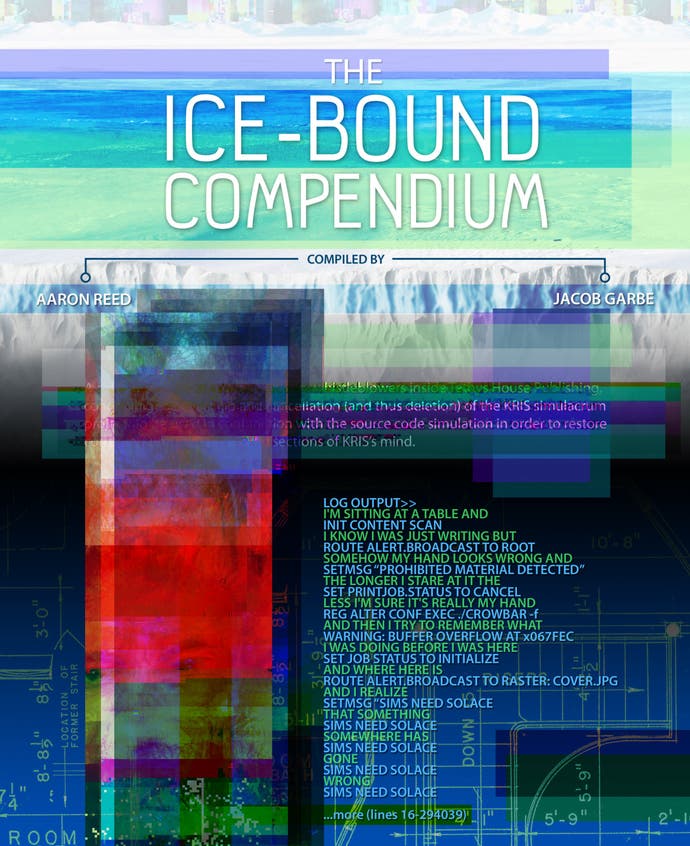
Moments like this. KRIS has heard of a book: The Ice-Bound Compendium. Have I seen it? I have, as it happens. And I have seen the EULA and the warnings that expressly tell me not to show this illicit text to KRIS. But of course I do. I have the book, shipped from Ice-Bound's designers in Santa Cruz. I hold certain pages of it up to the webcam on my PC, to show KRIS that we are on the right track with this novel we are writing. He asks for an image that matches the themes we are working towards. I turn the pages and make selections. And KRIS shows me these selections afresh, writing text on them as they are read by the webcam, or overlaying images. I show him a photo of an empty ice sheet, and he gives me a glimpse of what lies beneath.
Reacher is a long way away at this point. It reminds me, inevitably, of House of Leaves, a book that an awful lot of game designers seem to have read. House of Leaves is the story of a story, too. It has different narratives, different fonts, different viewpoints, different sections. I read through it shortly after it came out when I was in my early twenties. I read all the parts of it, even the boring parts I suspect you're meant to scan. If I read it again today, I would skip quite a lot, I imagine. (I think, specifically, I would skip everything in Courier and stick with the Times New Roman.)
But that's the point. Ice-Bound, like House of Leaves, is audacious and exhausting and niche - a youthful project, in the very best senses of the word. No killing the plot here. No nose to the page. No late-thirties backstory, no fired-from-a-job-in-telly. Ice-Bound is difficult stuff: fiddly to get to work, impossible, I reckon, to truly get to the bottom of. But it's worth it. It's the clearest example yet of a central truth we are going to have to get our heads around. In games - in any technology, and maybe even that's too narrow a scope - narrative means writing as often as it means reading. Just ask Google about that Keats poem.
